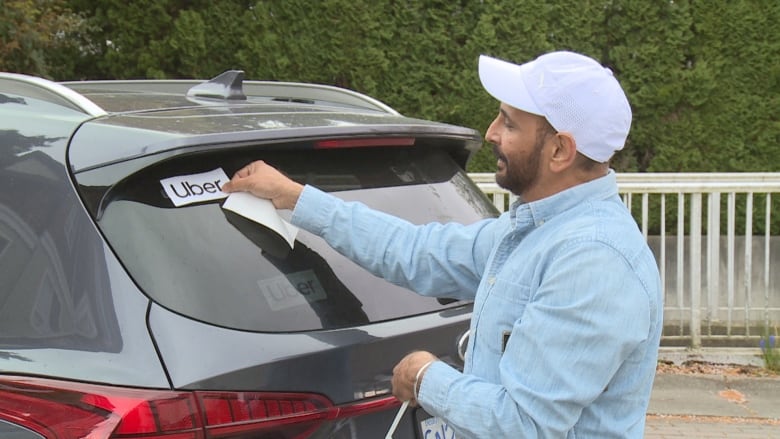New employment standards for people working through gig-based apps such as Uber, DoorDash, Skip the Dishes and Lyft will come into effect in British Columbia on September 3rd.
The regulations include a $20.88 minimum wage, workers’ compensation coverage and pay transparency measures, but some gig workers remain skeptical.
“It’s good that the bill is passing, but this is not the bill we were looking for,” said Kuljeet Singh, an Uber driver in the Metro Vancouver area.
The province says the new regulations will set employment standards for about 46,000 employees who work in ride-hailing and delivery in B.C.
Experts say the rules would define app-based gig workers under B.C.’s existing labour laws and establish new ways for the province to hold apps accountable as employers. Critics say the rules don’t fairly compensate ride-hailing and delivery workers.
Uber did not immediately respond to a request for comment.
Vehicle allowance, working hours
The new rules establish a minimum vehicle allowance of 35 to 45 cents per kilometre to help workers cover costs.
Platform companies would be prohibited from withholding or deducting tips, and would be required to enroll workers in WorkSafeBC’s workers’ compensation insurance.
Until September, platforms could send workers work assignments without telling them where the trips would take them or how much they would earn per trip. Under the new rules, apps must provide those details to workers before they accept the job.
Ride-hailing and delivery workers receive the minimum wage from the time they accept a job until they complete it. Under the new rules, this time is called “engaged time,” and workers don’t receive pay while they’re waiting for a job assignment.
The state did not immediately respond to a request for comment.
‘A good start’
Veronique Ciuffi, a racial and socio-economic equity researcher at the Canadian Centre for Policy Alternatives, said reactions to the new restrictions have been mixed.
She says the new rules define gig workers as employees and give them the same rights as other workers in B.C.
“This definition is a good start and establishes a foundation for us to work on in the future,” Ciuffi said.
“That was a really significant breakthrough.”
She added that the rule paves the way for labor protections for other online gig workers.
But Ciuffi said that even with the new regulations, gig workers still don’t have access to all the benefits of the Employment Standards Act, such as vacation pay, benefits, pensions, employment insurance, etc. He also said it’s not yet clear whether the changes will actually translate into higher earnings for gig workers.
“The big question is whether these measures will ensure that platform workers have a take-home income that is at least equivalent to the legal minimum wage,” she said.

The cost of waiting
As he sets off on the road again, Singh is not hopeful.
On Tuesday, he waited two hours at Vancouver International Airport to be assigned a passenger, and he said he often waits hours for a ride request to come through the app.
According to Ciuffi, drivers often spend 40 to 60 percent of their time not driving.
The province says those wait times are the reason ride-hailing and delivery workers’ minimum wage is 20 per cent higher than British Columbia’s minimum wage of $17.40 an hour.
But that doesn’t make up the difference, said Singh, who said he often works more than 13 hours a day.
“Do you think it’s safe for us to do this?” he said. “But we don’t make enough money, so we have to do this.”
He wants to put a cap on the number of drivers apps can hire in a city, which he says would reduce the driver supply, resulting in more trips per driver and less wait time.
“I’m glad that at least there’s transparency… and [workers’ compensation] “That’s a good thing,” he says, “but other than that it’s the same struggle. You don’t make enough money. You can’t survive on the hours you’re working.”
#gig #worker #rules #force #British #Columbia #sparking #hopes #skepticism #CBC #News